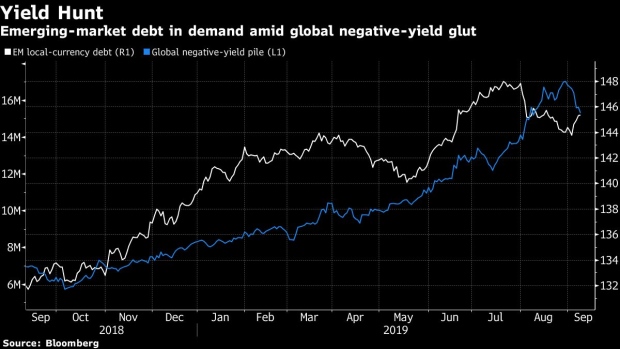Sep 11, 2019
Traders Pin Hopes on Draghi for the Next Leg of Emerging-Market Bond Rally
, Bloomberg News

(Bloomberg) -- What emerging-market bonds do next depends on whether Mario Draghi plays ball.
Provided the European Central Bank president lowers borrowing costs deeper into negative territory and restarts a bond-buying program, high-yielding debt in the developing world may see its popularity soar among investors desperate for returns, according to Union Bancaire Privee. And currencies that aren’t sensitive to the euro, such as the Mexican peso and the Brazilian real, will rise, according to Vanguard Group’s active fixed-income unit.
“Following the August correction, one would expect high yielding emerging-market currencies to receive a boost from a dovish message by the ECB,” said Anders Faergemann, a senior money manager at Pinebridge Investments in London. “Latin American currencies stand to benefit more than central and eastern European currencies, which are more correlated with the euro.”
Valuations across emerging markets improved after concerns over global economic growth prompted investors to dump yield for quality. The premium investors demand to hold sovereign bonds blew out in August by the most in a year, while a MSCI Inc. index tracking currencies suffered its biggest loss since 2012, making the assets’ allure even more appealing when compared with developed-market debt.
Emerging-market dollar debt has returned 10.8% this year, competing with U.S. junk bonds for the top spot. A dovish Draghi would could extend this rally, given the expectations for rate cuts across emerging markets. BNP Paribas sees at least 10 central banks to reducing borrowing costs in September, and 15 by end-2019.
With more than 80% of economists surveyed by Bloomberg predicting the ECB will announce a resumption of bond buying, and forecasters seeing the deposit interest rate falling to a record minus 0.5%, here’s what emerging-market investors are saying in the run-up to Thursday’s decision:
Daniel Shaykevich, a Pennsylvania-based lead fund manager and co-head of the emerging markets and sovereign team in Vanguard Group’s active fixed-income group:
- “ECB’s past and expected bond buying has depressed yields around the world and has forced EM and crossover investors into longer duration investment grade bonds such as Saudi and Qatari bonds and high quality Latin American sovereigns such as Peru and Panama”
- “We’re going into the ECB defensively positioned, but we also own short-dated options to benefit from any upside in EM currencies”
- “A failure to deliver on market expectations on Thursday would cause a sell-off in higher-quality, longer-dated assets. Unlike riskier bonds, these higher-quality bonds trade at historically tight spreads and don’t have the cushion to absorb higher rates. They also don’t offer sufficient upside into a risk-on move if the ECB delivers beyond expectations”
Ksenia Mishankina, a senior credit analyst at Union Bancaire Privee, in London:
- Emerging-market valuations are attractive compared to European credit. “After adjusting for the hedging costs, investment grade U.S. credit is yielding around 0, whereas emerging-market investment-grade corporate debt is offering a premium of about 90 basis points”
Pinebridge’s Faergemann:
- “‘Anything less than a small rate cut and some type of quantitative easing would be considered a disappointment by the financial markets and would risk a sell off in emerging-market high yield currencies such as the South African rand and the Brazilian real”
Morten Lund, an analyst at Nordea Bank AB in Copenhagen:
- “Draghi will deliver as he almost always does. He is a master at the these press conferences. Therefore, I would bet on lower euro core rates and a weaker euro. Normally, a lower EUR/USD means weaker central and eastern European currencies, but here it should be a risk-on signal. In terms of bonds, I think it is more tricky, but I would bet on lower rates”
Francois Savary, chief investment officer at Prime Partners SA in Geneva:
- “The good surprise would be if there was a reference to possible ETF equity purchase down the road”
- “In developed markets there is a need for a setback in yields, but not sufficient to penalize EM debt that have a good carry. Moreover I think that a process of liquidity injections in developed markets” is positive for emerging markets. “I remain positive on emerging-market debt. We didn’t reduce our overweight”
Tatha Ghose, analyst at Commerzbank AG:
- “ECB easing is kind of discounted. The economic and inflation downswing here is clear enough that it would be seen as ECB reacting in line with data. In general, we forecast that EURUSD will bottom out at around 1.10 levels and gradually start climbing. If U.S. inflation falls sharply, then one would get the next risk on move in emerging markets”
Paul McNamara, a London-based fund manager who helps oversee $9.4 billion in assets at GAM UK:
- “I think it’s a sideshow, very unlikely to have much of an impact. Growth and the Fed will be the real drivers of emerging-market debt”
Piotr Matys, a strategist at Rabobank in London:
- “A comprehensive stimulus package which we expect the ECB to reveal on Thursday may improve market sentiment”
- “But we do not anticipate a major outbreak of optimism and positive mood may fade relatively quickly if market skepticism about the ability of major central banks to offset the negative impact of trade war continues to rise”
To contact the reporters on this story: Selcuk Gokoluk in London at sgokoluk@bloomberg.net;Adrian Krajewski in Warsaw at akrajewski4@bloomberg.net
To contact the editors responsible for this story: Dana El Baltaji at delbaltaji@bloomberg.net, Alex Nicholson
©2019 Bloomberg L.P.